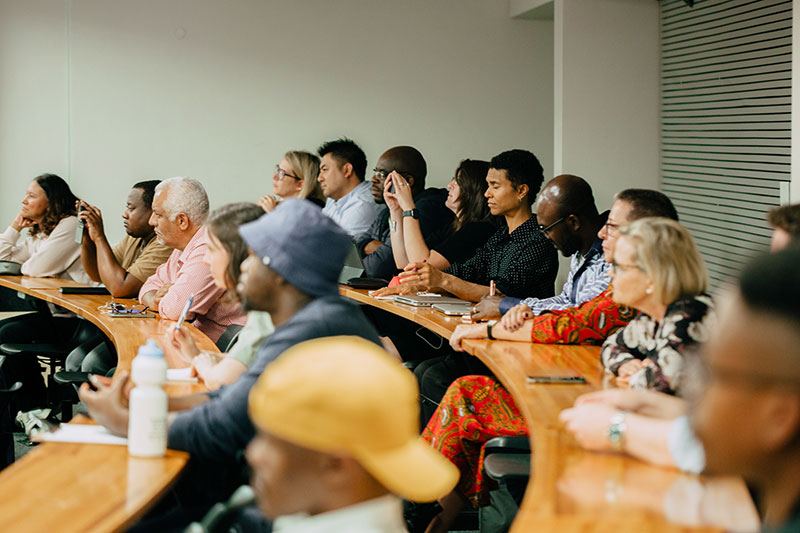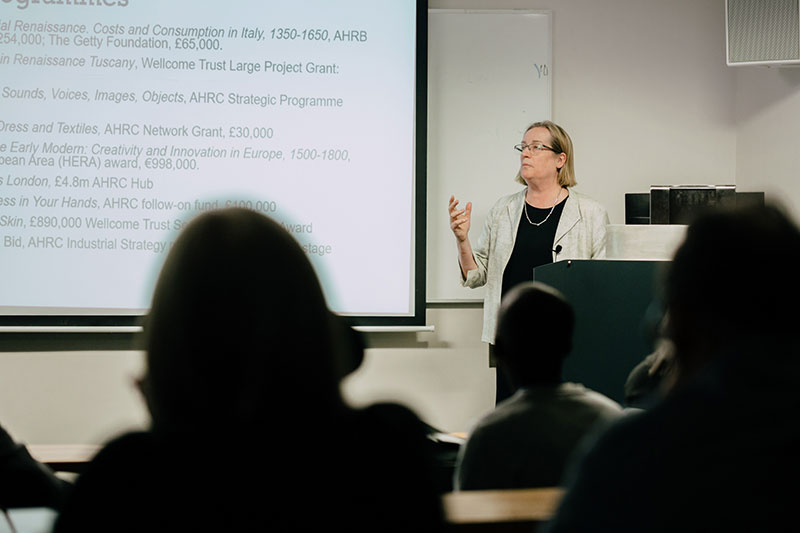VC Open Lecture: Why studying humanities remains relevant
10 March 2023 | Story Kamva Somdyala. Photos Robyn Walker. Director Ruairi Abrahams and Nico Badenhuizen. Videography and Video Edit Ruairi Abrahams. Read time 5 min.There is evidence to suggest that there is a general drop in humanities enrolments in countries like the United States (US) and the United Kingdom (UK). But, according to Professor Evelyn Welch, the vice-chancellor (VC) and president of Bristol University. “The humanities will continue to play a crucial role in shaping the future of our societies.”
Professor Welch was speaking at the University of Cape Town’s (UCT) Vice-Chancellor Open Lecture, hosted by UCT acting vice-chancellor, Professor Sue Harrison, on 7 March.
Welch titled her lecture, “Why humanities matter in a 21st-century university” and engaged the audience on a series of questions people often have about the field, ranging from its relevance to its output in the job market.
“I study price and value. I study worth. I study what becomes valuable and what is discarded. So, I must look at my own set of disciplines and [ask], ‘Are they in decline? Are they worth anything?’”

Economically irrelevant, dangerous
Welch said she’s had to confront these questions when broached by parents who are worried about whether investing in their child’s humanities degree will be meaningful. Students, on the other hand, are worried about job prospects once they graduate.
“The sad news is that there is an awful lot to suggest that in the US, UK and Australia, we do have a problem and that at least for some communities the future is all about science, technology, engineering and mathematics,” she noted.
“One primary cause of the decline appears to be a growing perception that the humanities are less relevant today. Does that mean that humanities degrees are economically irrelevant? Or even useless and dangerous?”
Global problems
“Julia Black, the strategic director of innovation and Professor of Law at the London School of Economics, suggests that the output of humanities disciplines is more intangible than engineering or life sciences.
“In an era of ever-increasing technological dominance, studying humanities is far from anachronistic.”
“There’s undoubtedly a belief in some quarters – this is a school of thought in Britain – that the humanities are more closely wrapped up in the so-called culture war issues than other disciplines,” Welch shared.
She said irrespective of the thoughts attached to the field of study, she does not see any contradiction between thinking great thoughts and doing great deeds.
“In an era of ever-increasing technological dominance, the study of languages, arts, music, theology and other humanities fields is far from anachronistic.
“In fact, they are more important than ever, precisely because they add to, but also counterbalance, the technological world that sometimes works and sometimes doesn’t.”
Combination of skills
Turning to the future, Welch said it is easy to see how the field of humanities will still find parity in university programmes, even though the decline in numbers is glaring.
This, she said, is because such a field of study will continue to “foster imagination, empathy and a deeper understanding of the human experience”. That is not where it ends, however, as humanities students should also learn other ‘languages’ outside their immediate faculty.

“Humanities students should also view AI [artificial intelligence], algorithms and coding as just another language to pick up.
“With there being calls for merging of arts humanities and traditional science, when we look at a 21st-century university, there is no question as to why we’re saying the future lies in that combination of skills.”
To show how a motley of skills is shaping the institution she oversees, a Temple Quarter Enterprise Campus is under way in the heart of Bristol. According to the development vision on their website, “the transformation of Bristol Temple Quarter is one of the UK’s largest regeneration projects”.
Welch said, “Tackling the challenges posed by the climate crisis and a changing employment landscape head-on, the regeneration will build on climate-friendly homes, jobs, and opportunities at the heart of the city, alongside new green spaces and an 18-hour economy, where visitors and residents can live and work and spend time.”
Explaining the work, Welch described it as being built in “the most deprived neighbourhood in Bristol”.
“We are bringing in an innovation campus in an area of depravation,” she said.
 This work is licensed under a Creative Commons Attribution-NoDerivatives 4.0 International License.
This work is licensed under a Creative Commons Attribution-NoDerivatives 4.0 International License.
Please view the republishing articles page for more information.
The Vice-Chancellor’s Open Lecture Series
The Vice-Chancellor’s Open Lecture series was established to enable anyone in the community, whether they are connected to the university or not, to have the benefit of hearing first-hand from academics, researchers and innovators from South Africa, but particularly from those around the world, who have distinguished themselves in their areas of expertise.
Attendance to the lectures is free of charge as the series is one of the ways that UCT seeks to give back to the Cape Town community.
2024
2023
2022
2021
2020
2019
2018
2017
2016
2015
There was no lecture in 2015.
























